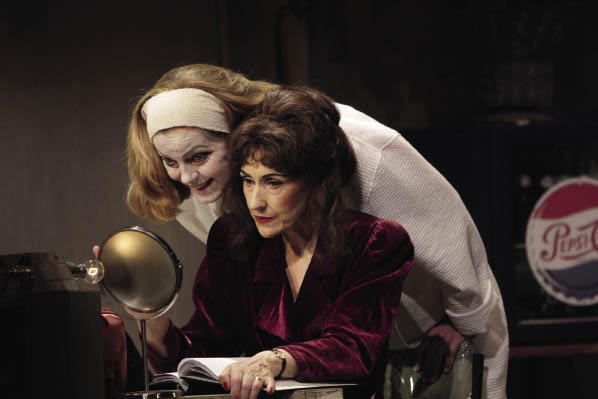Edward Albee doesn’t like the word ‘revival’. His plays aren’t dead, he says, just lurking. His 1966 drama A Delicate Balance has been coaxed back into the limelight by James Macdonald in a sumptuous new version starring Penelope Wilton and Imelda Staunton.
Edward Albee doesn’t like the word ‘revival’. His plays aren’t dead, he says, just lurking. His 1966 drama A Delicate Balance has been coaxed back into the limelight by James Macdonald in a sumptuous new version starring Penelope Wilton and Imelda Staunton. We’re in a New England mansion whose unshowy opulence is brilliantly suggested by designer Laura Hopkins. The chairs are elegant, costly and fading. The shelves are neatly crammed with dilapidated classics. And on the sideboard a great rash of family photographs hints at an ominous hinterland of family complexities.
Steely matriarch Agnes, played by Penelope Wilton, is watching her family slide towards total collapse. Her daughter’s fourth marriage has imploded; she suspects her husband Tobias (Tim Pigott-Smith) of concealing an affair; and her sister Claire (Imelda Staunton) has fallen off the first step of the AA programme and landed in a sea of booze. Scabrous insults pitch back and forth.
‘Why don’t you just die?’ says Claire, perfectly passionlessly, to Agnes. Proffering her glass to Tobias and touting for a refill, she says, ‘It’s only the first one I’m not supposed to have.’ Agnes suspects that Claire knows more about Tobias’s infidelities than she’s willing to say but her desire to elicit the truth exposes her to further scorn. Reeling with drink, Claire straps on an accordion and fills the room with bursts of butter-fingered atonality. ‘I can yodel too!’ she threatens.
This is Albee on top form. Sophisticated adults bickering like snide little kids. The effect is wonderful. What a shame it can’t last. Ever susceptible to the temptations of Absurdism, Albee decided to throw his play off-course with a big fat slice of symbolist nonsense. Harry and Edna, Tobias’s oldest friends, show up out of the blue claiming to have been hounded from their home by unnamed ‘terrors’ and asking for sanctuary in the spare room. Agnes reluctantly welcomes them in but when her divorced daughter arrives the drama descends into a tedious tussle for control of the contested bedroom.
After two excellent acts the final hour is a complete yawn. And Imelda Staunton’s fabulously loose-tongued Claire is left slumped in a chair, drinking spirits and saying nothing. Tim Pigott-Smith does his best to make sense of the pretentious rhetoric Albee has scripted for Tobias, who has a spectacular and frankly unintelligible breakdown near the end. Albee called these hysterics an ‘aria’ which suggests how detached he’d become from creative reality. This play won the Pulitzer. What it really needed was a rewrite.
The wonderful Arts theatre has a terrific show about Bette Davis and Joan Crawford. Playwright Anton Burge shows us the warring stars behind the scenes of the greatest bitch-flick ever made,Whatever Happened to Baby Jane?’. The storyline is a little meagre and the dramatic trajectory may be entirely predictable but as a study of ageing stardom it is exquisitely detailed and thoroughly entertaining.
The two women are so different they might have been friends. Bette Davis, the swaggering upper-class Yankee, curses like a cowboy and never scruples to speak her mind. Joan Crawford, from the opposite pole of American society, is a white-trash chancer who made it against all the odds and is desperate not to let the mask slip. A sly, feline manipulator with a pathological fear of dirt she conceals her vicious nature beneath a veneer of charm. Posing in a chair covered with Cellophane she takes delicate sips from a little Pepsi bottle rammed full of vodka. Davis despises Crawford for being a ‘movie star’ rather than a serious theatre actress. ‘She slept with everyone on the lot except Lassie,’ spits Davis. ‘And because of “the germs” I only get to touch her when I slap her. And even then she uses a double.’ Crawford reminisces about her conquests, including Clarke Gable (‘the king’ as she calls him) and Rock Hudson. ‘Close your eyes,’ she told Hudson, ‘and imagine I’m Errol Flynn.’
There’s an odd symmetry between cast and characters here. Popular soap star Anita Dobson plays Crawford while Davis is impersonated by the distinguished stage actress Greta Scacchi. This she does faultlessly. The voice, the gestures, the intonation and the emotional alignment of Davis are all superbly captured. Anita Dobson’s take on Crawford is more direct and perhaps even a touch obvious. But it’s none the worse for that because Dobson turns out to be a sublimely funny stage presence. She turns Crawford’s creepy, unhinged hypocrisy into comedy gold. ‘I’m a perfectionist,’ she simpers, ‘which is a wonderful thing to be.’ And everyone knows she’s an alcoholic nympho with a psychotic streak clinging desperately to the life raft as her career hits the rocks. This fascinating and hilarious show has the makings of a cult hit.







Comments